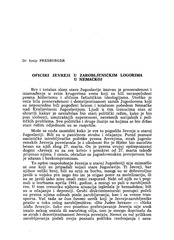Приказ основних података о документу
Oficiri Jevreji u zarobljeničkim logorima u Nemačkoj
Yugoslav Jewish officers in prisoners of war
| dc.creator | Presburger, Josip | |
| dc.date.accessioned | 2019-11-27T15:28:52Z | |
| dc.date.available | 2019-11-27T15:28:52Z | |
| dc.date.issued | 1975 | |
| dc.identifier.issn | 0353-0612 | |
| dc.identifier.uri | https://www.jevrejskadigitalnabiblioteka.rs/handle/123456789/116 | |
| dc.description.abstract | Brz i totalan slom stare Jugoslavije izazvao je preneraženost i iznenađenje u svim krugovima sveta koji su bili neraspoloženi prema hitlerizmu i sličnim fašističkim ideologijama. Utoliko je veća bila preneraženost i dezorijentisanost samih Jugoslovena koji su neposredno bili pogođeni brzom i totalnom pobedom Nemačke nad Kraljevinom Jugoslavijom. Ljudi u tim trenucima nisu ni shvatili kakav je nestabilan bio stari politički režim, kako je bio pun slabosti, unutrašnjih suprotnosti, nerešenih socijalnih i političkih problema. Sve političke i druge iluzije na kojima se bio držao stari režim odjednom su se raspršile. Može se onda zamisliti kako je sve to pogodilo Jevreje u staroj Jugoslaviji. Bili su u paničnom strahu i očajanju. Pored poznate nacističke istrebljivačke politike prema Jevrejima, strah jugoslovenskih Jevreja povećavala je i okolnost što je Hitler bio naročito besan na njih zbog 27. marta. On je prema svojoj opštepoznatoj dogmi "Jevreji su za sve krivi" i preokret od 27. marta takođe pripisao njima. I zaista, obračun sa jugoslovenskim jevrejstvom bio je užasan i beskompromisan. To opšte raspoloženje Jevreja u staroj Jugoslaviji nije mimoašlo ni one koji su pripadali vojsci stare Jugoslavije. Ti Jevreji, bar njihov veliki broj, bili su oni za borbu, mnogi su se dobrovoljno javili u vojsku pre nego što im je stigao poziv za mobilizaciju, ili su se javili iako nisu imali ratni raspored. Neki od njih su i poginuli u borbama aprila 1941. godine, a mnogi su pali u zarobljeništvo. U tom trenutku njihova situacija izgledala je beznadežna; bili su u očajanju i depresiji. Grubi diskriminatorski postupci počeli su prema njima odmah posle zarobljavanja, kao i za vreme transporta. Već tada se čuo čuveni uzvik koji je Jevreje - zarobljenike pratio u toku celog zarobljeništva: "Die Juden heraus" - "Neka iziđu Jevreji". Iako ovo posebno prebrojavanje Jevreja nije uvek imalo nekog smisla ili naročitog cilja, ono je mnogo doprinelo da se strah i dezorijentisanost Jevreja povećaju. Nemci su već prilikom zarobljavanja počeli svoju poznatu politiku razdvajanja i zavađivanja raznih jugoslovenskih naroda i narodnosti, pa su pojedini iz tih grupa i grupacija ispoljavali antisemitski stav prema Jevrejima još za vreme transporta. Sve ove okolnosti, a najviše samo osećanje da ih vode nekud u unutrašnjost Hitlerove Nemačke, os- tavilo im je malo nade da će ikad sve to preživeti. | sr |
| dc.description.abstract | In this work, the author writes about the participation of the Yugoslav Jewish officers in the struggle waged in the prisoners of war camps in Germany in support of the Peoples' Liberation War of the peoples of Yugoslavia. He points to the general disillusionment and disorientation of the officers of the former Yugoslav royal army who found themselves in German captivity after the sudden and complete collapse and the break-up of the Kingdom of Yugoslavia. Those officers who were Jews had even more reasons for despair when in camps in the heartland of Nazi Germany. Reference is made to the status of Jewish prisoners of war in the Nürnberg camp where they were ordered, in spite of protest, to carry on their uniform a yellow star marked "Jude", and where they were exposed by the German command to other discriminatory measures as well. At the same time, the majority of non-Jewish officers demonstrated marked solidarity with their Jewish colleagues. The first steps of the illegal Communist Party in the Nürnberg camp are also described. Its primary aim those days was to make the disoriented officers get rid of their despair and to inject in their thinking a faith in the victory of the Allies and in the rebirth of Yugoslavia in which new social forces will make the strivings and aspirations of the Yugoslav people a reality. Reference is made to the Jewish officers who were members of the leadership of the illegal organizations. After the transfer of the Jewish officers from Nürnberg to the Osnabrück camp in May 1942, practically all the Jewish officers in German captivity, about 400 of them, found themselves concentrated in that camp. Within the Osnabrück camp the political struggle became a day to day affair and the polarization of forces which, generally speaking, divided the officers into two groups was practically completed: one group advocated the reestablishment of the old regime, the kingdom, while the other stood for the uncompromising struggle against the occupiers offering at the same time prospects of a new social order. This second group was organized and lead by the illegal Communist Party in the camp and was, in fact, part of the mass movement in Yugoslavia where the armed struggle against the occupiers was based on the support of broad masses of the people. The overwhelming majority of the Jewish officers joined this second group and participated in the political, cultural, professional and other activities. After an intensive phase of the struggle in the camp was over, the Jewish officers and about 400 other officers marked as "dangerous communist elements" were secluded in the so-called "D” camp which was separated from the other parts of the camp by a barbed-wire fence and protected by a special armed guard. A number of Jewish officers were included in the illegal activity the Communist Party organized in the camp. During a period of time, the centre of this illegal activity was in the Jewish barrack No. 37, in room No. 7. Here a radio set was kept, here the allied stations were listened to and a daily news bulletin edited to be sent through established channels to those barracks which housed the members of the organization. There was also the technical service of the illegal organization which was responsible for the hiding of pieces of arms the organization succeeded to acquire and of other materials and tools used by the illegal technical service. Jewish participation was also marked in the legal activities coordinated by the Cultural Board and guided by the leadership of the illegal organization. Jewish officers were active in the professional associations (of lawyers, engineers, and other), in the drama and musical society, in the literary circles, practically in all activities in the camp. Out of many events of political importance a few are singled out and described in more details, such as the demand for elections within the camp to be held in accordance with the provisions of the Geneva Convention, the refusal of food because of its poor quality, and a few other events. The participation of Jewish officers in all these encounters in the camp is referred to as one of the causes of their transfer as a group, in August 1944, to Strasbourg camp were they continued their active political role. Because of the advance of the Allies, they were transferred subsequently to the camp in Barkenbrügge, near the former Polish frontier to be moved again towards the west, in January 1945, when the westward advance of the Red Army was in full swing. One group of the prisoners of war, a number of Jewish officers among them, succeeded to get rid of German guards and to reach Yugoslavia already in March 1945, travelling with the assistance of the Soviet authorities through Poland and Rumania. The other group had to go four weeks on foot westward under very difficult conditions. The group was sent to the former concentration camp in Alexisdorf, near the Duch frontier and was later ordered to go on foot south-west to be eventually left without guards and liberated by the British troops. A number of liberated officers, with quite a few Jews among them, remained for a while in Germany as liaison officers with the allied troops or attached to various Yugoslav missions in charge of repatriation, restitution and similar important duties of those days. Those who were repatriated, just as the members of the first-mentioned group, either joined the Army or were given duties in the administration of the country. | en |
| dc.language.iso | sr | sr |
| dc.publisher | Beograd : Savez jevrejskih opština Jugoslavije [Federation of Jewish Communitues in Jugoslavia] | sr |
| dc.rights | openAccess | sr |
| dc.rights.uri | https://creativecommons.org/licenses/by-nc-nd/4.0/ | |
| dc.source | Zbornik 3 : Studije i građa o učešću Jevreja u Narodnooslobodilačkom ratu, Jevrejski istorijski muzej - Beograd = Jewish studies 3 : Studies and facts and figures on participation of Jews in the people's liberation war, Jewish historical museum - Belgrade | sr |
| dc.subject | Jevreji - oficiri | sr |
| dc.subject | Jews - Yugoslav officers | sr |
| dc.subject | Jevreji - Narodnooslobodilačka borba | sr |
| dc.subject | Jews - liberation war | sr |
| dc.subject | Osnabrik (zarobljenički logor) | sr |
| dc.subject | Osnabrück (prison camp) | sr |
| dc.title | Oficiri Jevreji u zarobljeničkim logorima u Nemačkoj | sr |
| dc.title | Yugoslav Jewish officers in prisoners of war | en |
| dc.type | article | sr |
| dc.rights.license | BY-NC-ND | sr |
| dcterms.abstract | Пресбургер, Јосип; Официри Јевреји у заробљеничким логорима у Немачкој; Официри Јевреји у заробљеничким логорима у Немачкој; | |
| dcterms.abstract | Пресбургер, Јосип; Официри Јевреји у заробљеничким логорима у Немачкој; Официри Јевреји у заробљеничким логорима у Немачкој; | |
| dc.rights.holder | Savez jevrejskih opština Srbije = Federation of Jewish Communities of Serbia | sr |
| dc.identifier.fulltext | http://jevrejskadigitalnabiblioteka.rs/bitstream/id/186/JIM0306JOSIPPRESBURGEROFICIRIJEVREJIUZAROBLJENICKIMLOGORIMA.pdf | |
| dc.type.version | publishedVersion | sr |
| dc.citation.spage | 225 | |
| dc.citation.epage | 276 | |
| dc.citation.issue | 3 | |
| dc.identifier.rcub | https://hdl.handle.net/21.15107/rcub_jdb_116 |
Документи
Овај документ се појављује у следећим колекцијама
-
Zbornik JIM 03 [Jewish Studies JHM 03]
Studije i građa o učešću Jevreja u Narodnooslobodilačkom ratu / Studies and facts and figures on participation of Jews in the people's liberation war -
Holokaust u Jugoslaviji [Holocaust in Yugoslavia]

